Well-known website builders such as Wix, Weebly and Squarespace make it easy for even a newbie to put together something polished in a relatively short time, even when they need advanced features like an e-commerce platform or email marketing. Gone are the days of needing to be a web developer with a lot of money, time and coding skills to create a simple website that looks professional.
Finding the best website builder depends on the website owners' particular needs - the process can be overwhelming because there are so many choices from free website builder options for a simple website to e-commerce website builder platforms for a more complex business website. But the growth and complexity of the website building industry also means you have more choices than ever before, and you can easily find the best website builder tailored to your wants and needs.
Editors' top picks
Subscribe to CNET Now for the day's most interesting reviews, news stories and videos.
It's true that a few favorites have emerged - and those top website builder options are usually a good place to start - but even the front-runners aren't ideally suited for every scenario. To make it simple for you, we've compiled all the information you need to make a good decision on the best website builder and get to the fun part of designing your own website. We took into consideration factors including if the builder offers an SEO tool, a solid customization option and the strength of the company's customer support.
*Starting price doesn't include cheaper plans if they are ad-supported. Some vendors offer free domain hosting for the first year on some plans as well.
To compile this list, we researched the prices, plans and features of over 12 different website builders and scoured reviews from several sites (including PCMag, Wirecutter, WebsiteToolTester, SiteBuilderReport, WPBeginner and more) to see where there might be any consensus. We also surveyed the CNET staff, and ultimately spent time building some test sites using the tools below (if we weren't already members). We paid particular attention to the categories that not only differentiate one site from another, but that actually matter to business owners, artists and creators such as SEO features, mobile-friendly website builders, live chat options, available plugins and customer support.
If, by the end of the list, you're still not sure which direction to go with your website building, we've included a guide at the bottom, including key questions you should be asking yourself as you start your online venture. Finally, if you already have a website and just need a host or you're interested in building a WordPress site, check out our list of best web hosting services.
Jump to: How to choose the best website builder
Wix is the clear front-runner in the race for website builder dominance. It's the biggest player with over 110 million websites built and boasts the greatest quantity of tools, capabilities, and freedom.
Wix covers the full ease-of-use spectrum by offering an AI-fueled automatic website creator on one end ("Wix ADI") that requires minimal effort from the user, all the way to Wix Corvid, an open development platform for advanced applications like Javascript, databases and data-driven dynamic pages. To maximize the experience, we do recommend choosing one lane (e.g., Wix ADI, specific templates or design-from-scratch), since it can be difficult to maintain consistency across your website design if, for example, you start with a template but then decide you want to totally customize it.
Like many competitors in this space, Wix offers a basic free website builder plan that lets you create a free website starter site with ads. If you like what you see with the free website builder, you can spend up for a premium, ad-free site. Pricing falls within industry standards with a $13-per-month "Combo" plan that covers most needs for a personal website. If you need an e-commerce website builder for your store, Wix offers a $49-per-month "Business VIP" e-commerce website plan for your online store. Those prices do not include a domain, so you'll need to account for that separately. And if you're interested in stats and analytics, you'll either need to get a Google Analytics paid plan or another third-party tool, as Wix doesn't have its own.
Despite being the clear favorite among most reviewers, Wix does have a few drawbacks. Wix was one of the few builders that has data limitations for each of its plan tiers, so if you want to upload endless photos and videos, or expect more than 5,000 visitors a month to your site, make sure you do the math before choosing a plan.
Also, the editor's freedom and range of options can be overwhelming for folks who don't have the time or inclination to make lots of little decisions and the web design flexibility means you'll need to be more hands-on with the format and layout, as opposed to more structured or limited editors where you can't draw too far outside the lines.
Read more: Best laptop deals 2020: Windows and Chromebooks for under $500
Read more: How to register a domain name
Read more: Domain names 101
GoDaddy is best known for its custom domain names and web hosting services, so it makes sense that it also offers website builder software. The name is a mouthful - "Websites + Marketing" - but it's a similar templatized experience like the other options on this list, designed to get a basic site up and running in under an hour.
The free tier includes such niceties as email and social media marketing, PayPal payments and an SSL certificate. The $10 monthly plan is straight-up basic; $15 adds an SEO tool; $20 tacks on extended support for appointments and its $25-per-month Ecommerce plan is for online store capabilities, including some impressive product listing and shipping options for your e-commerce store.
Despite the fact that GoDaddy is better known as a domain seller, a domain isn't included in those prices - you'll need to add that separately. But all in all, GoDaddy's current website creator is a nice step up from its now-discontinued GoCentral product. Likewise, by switching to a free tier, there's no longer a 30-day timer on your experience, so you can take your time kicking the tires to see if GoDaddy is right for you.
BigCommerce
BigCommerce lives up to its name - it's best for medium- to large-scale online stores that can cash in on the lack of added transaction fees and unlimited product variants. The store site builder might not be quite as easy to use as Shopify's, but the amount of time you spend getting used to it could save you a lot of money down the road.
The editor has a lot of features and flexibility when you're getting set up, but similar to Wix, that can be overwhelming for newcomers. If you have a little experience, however, those features and tools - like product variants and tax rates - will probably come in handy as you grow or if you're already at scale.
BigCommerce's price tiers are identical to Shopify's at $29 (Standard), $79 (Plus), and $249 (Pro), but what you get at each level differs. Even the lowest BigCommerce plan at $29 gives its clients unlimited users, unlimited bandwidth and storage, unlimited products, and no added transaction fees. You can even link your e-commerce site to eBay, Google Shopping and Amazon. Where the pricing gets a little tricky is with the sales thresholds: The Standard plan only supports annual sales of less than $50,000, while Plus supports up to $150,000 and Pro up to $400,000. So basically you save a lot of money on transaction fees the more sales you rack up, but if you have enough sales, you have to upgrade to the next plan tier.
As with all the online store builders, it'll be worth it to do a little math based on your product inventory and expected sales. No transaction fees - they even have a discount deal worked out with PayPal where you can save an additional 0.5% to 1% - strikes us as a major deal-maker depending on your size, so if you're a bigger operation, take advantage of the 15-day trial and give BigCommerce a shot.
How to choose the best website builder
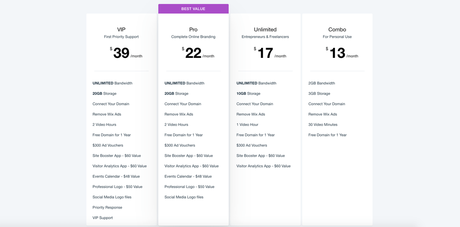
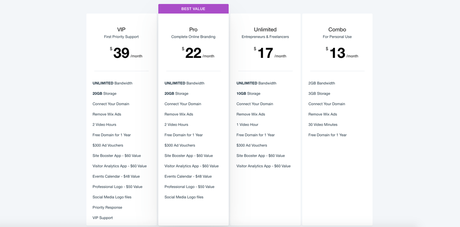
Wix
Given the wealth of options and the fact that many website builders don't allow you to pick up and move later on, it's important to enter the fray with a clear idea of what you need. By first establishing your priorities and direction, it will be easier to find a match for the best website builder and avoid buyer's remorse down the road.
In terms of pricing, most builders offer two to four different price tiers, each with a different set of features. This can make comparing services difficult, since they don't make it easy to line up apples-to-apples, but that's a big reason why we've created this handy guide!
Generally speaking, you can get a good individual website built for around $8 to $10 a month with an annual subscription. Most e-commerce plans range between $20 to $25 per month, and if you need an enterprise-style plan with multiple editors and VIP-level support, prices can go up to $300 per month for a premium plan.
Storage and bandwidth are usually unlimited, but there are exceptions like Wix, which scales its storage capacity according to the plan tier. And even its lowest tier plan has a decent amount (3GB of storage and enough bandwidth to support up to around 5,000 visitors per month).
After the big questions like price and storage, finding the best website builder all comes down to what you're looking for. Below are some guiding questions to help ensure you're ready to shop like an expert and find the best website builder for your needs.
What is the purpose of your site?




Squarespace
Your first step should be to determine the primary goal of your web presence. Do you want to sell a product? Attract potential customers for your services? Build a portfolio page?
By first establishing your raison d'etre, you'll be able to prioritize the tools, plugins and capabilities you want in your builder and not get pulled off track by a fancy add-on that isn't actually helping you achieve your goal. If you're primarily interested in racking up sales, start by looking at the e-commerce specialists, like Shopify and BigCommerce. If you're a photographer or web designer who wants a beautiful website or portfolio website, Wix and Squarespace are good places to start. Wix might edge Squarespace if you want more control over the design, while Squarespace might be better if you just want a stylish frame for your work.
If you just want something easy to use, Weebly and GoDaddy both offer intuitive builders, with Weebly offering more features and design finesse, while GoDaddy is much simpler and more limited. If you're setting up a site or store and you want to present a customized experience to users or you have something specific in mind for the mobile version of your site, Duda offers the most customization capabilities. And if you're a wordsmith who can't be bothered by design decisions and fancy editors, WordPress can help you get your blog up and offers good ways to reach your readers.
How much time do you want to invest in building your website?
This obviously will vary depending on a number of factors, not the least of which is how clear of a design vision you have and whether you have experience building a website. That being said, each site builder has pros and cons when it comes to level of usability or ease-of-use based on the features, flexibility and intuitive design of the editing interface. On one end of the spectrum you have a builder like Wix, which is very easy to use but also comprehensive - the sheer number of options and tools makes it hard to whip up a site quickly. On the other end, you have a builder like WordPress or GoDaddy, each of which doesn't provide you with a ton of options when building your pages.
Most people will want to devote enough time to their site that it serves its purpose of representing you online in a good light, so we generally recommend you take the time to learn your editor and take advantage of the many options available.
How much design control do you want?
This goes hand-in-hand with time investment, since the more control you have, the more choices you have to make. There are builders like Squarespace that have a fairly rigid design structure, but still let you customize fonts, colors and content, and on the other end of the spectrum you have a site like Wix, that lets you place objects anywhere on your site (at your own risk!), or Duda, which allows you to customize the mobile experience or create custom user experiences based on browsing history.
How big is your site?
Certain editors are more geared toward large site structures (40-plus pages) than others, so it's important to know whether you will have a ton of pages and sections, or whether it's more in the realm of a glamorized digital business card or fancy work portfolio.
The number of navigation levels, for example (which you can think of like file folders (or Inception): a page within a directory within another directory would represent three levels of navigation), can be an important consideration. Most pages probably use two levels - sections and the pages within each section, but online stores and other types of sites might need more. Weebly and BigCommerce are probably the best examples of builders that support large site structures, while Squarespace and Wix limit you to two levels of navigation.
How important is e-commerce?
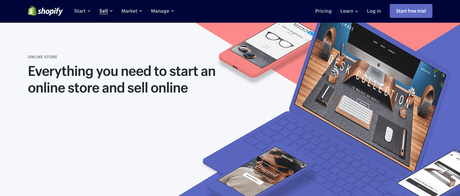
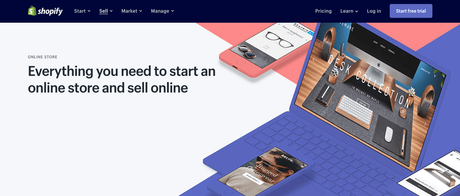
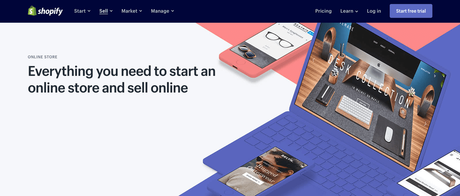
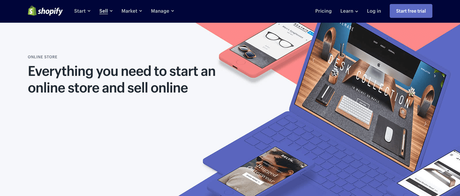
Shopify
Every builder we researched has an e-commerce option available, but that doesn't mean that they're all up to the task. A site like WordPress isn't really what you want if your plan is to sell products online, while a site like Shopify or BigCommerce is expressly focused on online sales and has lots of e-commerce features. If you really just want to have a clean and easy-to-use online storefront, one of the dedicated e-commerce builders makes the most sense, but if it's more of an ancillary service or simply nice to have, you can go with the builder that feels the best and sign up for its e-commerce option. There are even builders like Duda, which allow you to sell up to 10 products for free using another plan.
How big is your sales operation?
Transaction fees: While we're not small business owners, we do like math and this variable struck us as particularly important. If you sell $10,000 of products in a month with a 3% vendor processing fee, you're spending an extra $300 every month. If you're paying your website host an extra 1% to 3%, that's another $100 to $300. Those numbers greatly eclipse the monthly rate you're paying, and add up even more if you're selling significantly more. So before you choose a builder, make sure you read the fine print about transaction fees.
Many builders don't charge on top of the Square or Paypal rate (usually 3%), but some do. Shopify charges extra if you don't use Shopify Payments, but if you do use its services, you can get a rate below 3%. Then there are sites like BigCommerce, which doesn't charge extra and even has a PayPal discount, but has sales limits for each plan.
We know you're a smart and savvy business owner who pays close attention to the books, but we thought it would still help to remind you: do the math before signing up.
How flexible do you want to be with the host?
As we mentioned at the top, many builders lock you into their hosting service, but not all. If you're afraid of commitment or think you might want to switch as your business or services evolve, go with a service like Weebly or Duda that allows you to download your website files for easy use on another host.
The other big factor here is the free trial period. The industry standard is around 14 days, but some go up to a month, and others don't have a trial period but will give you your money back within 30 days if you're not happy.
